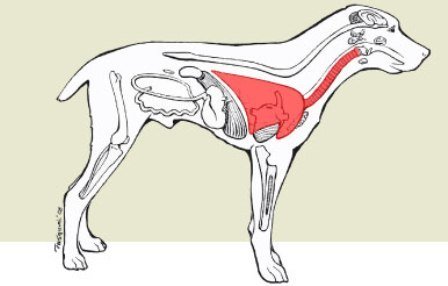How to Treat Kennel Cough
" The need to treat kennel cough or Infectious Tracheo Bronchitis starts with an understanding that is is an infectious disease. Several bacterial and viral specie may cause the disease. Antibiotic therapy is first line of treatment along with supportive therapy. Antibiotics should be prescribed by a qualified veterinarian, after thorough examination and diagnosis. Supportive therapy includes use of vitamins and some minerals. Natural remedies are another option for treating kennel cough. Prevention includes vaccinating dogs against several viral and bacterial diseases. "
To treat kennel cough a management plan will include:
- Care to improve the disease fighting ability of the dog
- Approaches for minimizing the discomfort of symptoms
- Antibiotic and supportive therapy
- Preventive Measures
Management & Care Needed to Treat Kennel Cough
Affected
dogs should never be hospitalized. The
disease is highly contagious and has the potential to spread rapidly.
It is recommended that such dogs should be treated in an isolated and
open environment, i.e. should not be kept housed for long periods of
time.

Treat Kennel Cough involves helping a dog with respiratory system related symptoms
Source: Cornell University College of Veterinary Medicine
Appropriate management may include an adequate nutrition plan, hygienic measures, nursing care along with reducing or eliminating predisposing environmental factors such as cold and hot weather, stale air and crowded housing. It is noted that better management and care results hastens the recovery rate and the speed with which you can treat kennel cough.
Symptomatic Kennel Cough Treatment
Cough suppressants are usually helpful in reducing cough. Codeine derivatives are usually the best choice. Hydrocodone & Butrophanol are some compounds containing codeine derivates. Cough suppressants should only be used in case of persistent, dry or non productive cough. Natural remedies such as honey, sugar, peppermint is usually more effective in controlling cough. Honey e.g. controls cough by reducing irritation of throat and epithelial tissues.
Antibiotic Therapy
Antibiotics are only prescribed in severe, chronic cases. Confirmed diagnosis, through physical examination and a series of positive laboratory tests and sensitivity tests to treatment options can be helpful in selecting the dose the the type of antibiotics that should be administered.
Cephalosporins, chloramphenicol, quinolones & tetracycline are preferred to treat kennel cough. Your veterinarian will select oral medications or intramuscular injections . In severe cases only aerosolization bid for 3 days is effective, containing gentamycin sulfate (250 mg) or kanamycin sulfate (50 mg) diluted in 3 ml of normal saline. Drugs called “Bronchodilators” which relaxes the bronchus, thus increasing space for breathing are usually used along with aerosolization, to ensure reach of antibiotic up to lungs.
Precautions:
Corticosteroids are the drugs used to alleviate clinical signs caused by mild infections, but should never be used with antibiotics as they have severe side effects in severely ill, coughing dogs. Dogs should be tested for any sensitivity towards antibiotics before prescribing.
Supportive Therapy:
Vitamins, especially vitamin C are very helpful in
reducing clinical signs of kennel cough. Moreover mineral supplements
and nutritional supplements help in recovering from conditions that are
interfering with the normal operation of the body (physiological
conditions) leading to normal systemic functioning of body.
Natural or Organic Treatment:
Honey, sugar, peppermint has soothing effect on the epithelial of throat. It may be helpful in reducing cough, and are safe to use along with antibiotics.
There are also homeopathic natural remedies
available that can provide additional support for dogs suffering from
Canine Kennel Cough. PetAlive
KC-Defense Formula can naturally help to temporarily relieve
symptoms such as sneezing and coughs.
Prevention:
To prevent kennel cough, dogs should be vaccinated with attenuated or modified live virus vaccines for distemper and Para influenza viruses. Initial vaccines should be given at age of 6 – 8 weeks, and repeated twice in 3 – 4 weeks intervals, until the dog reaches 14 – 16 weeks of age. This vaccine should be then repeated annually.
Commercially these vaccines are available via injections and intranasal preparations.
Have a Canine Cough Related Question or Helpful Story?
Have a Question, Request or Want to Share a Story that could help others? Our editors and pet health professionals will answer 1 question per week for free!
We will do our best to get back to you quickly (it depends on how many questions we receive each day). If you do require an immediate response we suggest using this online dog veterinary service that is available now.
What Other Dog Owners Have Said
Click below to see contributions from other visitors to this page...
Canine Kennel Cough Treatment 




Reader Question: How Can I Treat A Dog With Kennel Cough?
Hi there. I live in Bali, Indonesia. I have several dogs suffering from kennel cough and …
|
|
References:
J. K. Dhun, Textbook of Small Animal Medicine (Elsevier Health Sciences, 1999)
This site accepts advertising and other forms of compensation for products mentioned.
Such compensation does not influence the information or recommendations made.
We always give our honest opinions, findings, beliefs, or experiences.
All rights reserved. © 2018 Dog Health Handbook.




